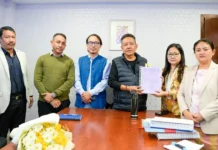[ CI Mannou ]
Agriculture is the backbone of Arunachal’s economy and the primary source of livelihood of our population. No wonder the majority of the state’s population is still dependent on traditional agriculture practices. They characterize agriculture on the basis of paddy and maize as cereal crops, and mustard as a Rabi crop for oil.
The first challenge in agriculture is irrigation. People construct irrigation facilities using the traditional method of building dams on the local rivers. However, although irrigation should bring about greater value of the products, the irrigation coverage of total sown areas is small, and therefore half of the farming population is dependent on the monsoons. But sometimes climate change makes agriculture a risky venture, with the farmers facing distress despite many years of producing paddy.
To tackle the situation, the state government has focused on agriculture productivity gains by launching multiple schemes with new technologies, like provision of irrigation facilities, modified improved variety crops and hybrids, etc, to acknowledge its important role in providing food security to the farmers. Besides, the department concerned has embarked on a comprehensive agriculture management programme and gives farmers access to agriculture-related information. People appreciated the steps adopted by the government.
However, despite the great efforts made by the government, people are still not self-sufficient in food grains due to the lack of land for expansion of cultivation areas. In addition, the farmers do not get stable markets to sell their products in their areas.
Besides, the government has never arranged any system of offering minimum support price in the local regions. Therefore, in reality, farming is not much of a money-making activity as all the profits go to the middlemen. The farmers also lack storage facilities to hold on to their stocks.
These facts assume importance in the wake of the poor agrarian income which led to farmers reeling under economic distress. The farmers do not earn much, which makes their lives difficult and compels them to find jobs in towns to supplement the family income.
Due to the lack of alternative income sources, some of them are promoting poppy cultivation in some areas of the state, as they find better prices and more buyers when the crops are ready. It is an open secret that money generated from illegal poppy trade plays a key role in making a better living. This illegal trade has become an unending dirty secret, despite the ban imposed by the government.
The government should now prepare a national action plan on opium and drug abuse. The plan should be focused on conducting awareness programmes at school, colleges, universities and panchayats, and rehabilitating drug-dependent people in order to integrate them back into the society. (The contributor is a retired principal, based in Chongkham)



